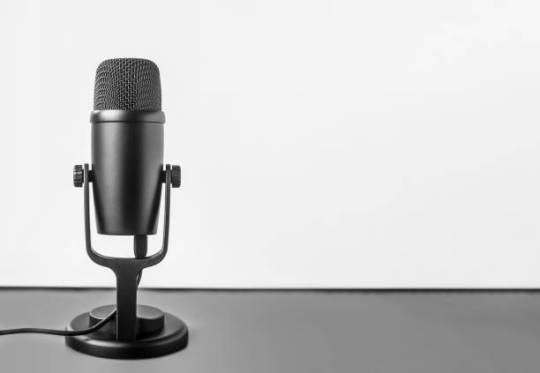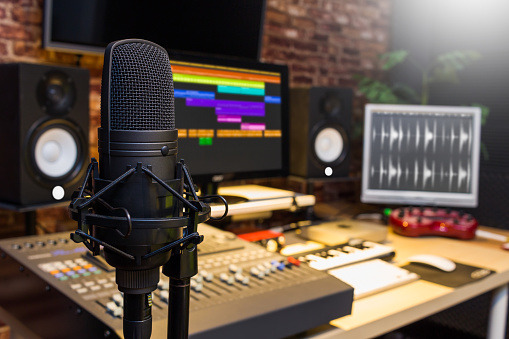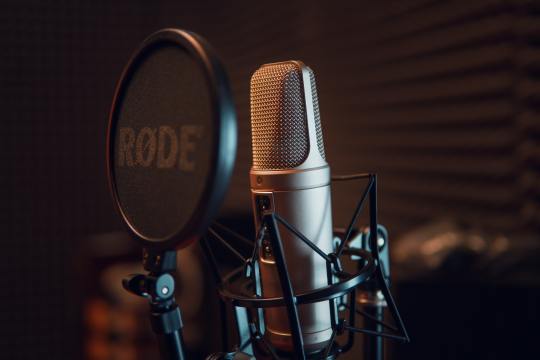Don't wanna be here? Send us removal request.
Text
The importance and advantages of language and accent for commercial voice over artists

Language And Accents For Commercial Voice Over Artists
Language is an integral part of any communication. Multilingual means the ability of a person to speak multiple languages fluently. As a commercial voice over artist, being multilingual gives you an advantage over non-multilingual voice over artists.
Apart from English, the following are the top ten in demand languages in the voice-over industry. They are:
Spanish
French
German
Arabic
Portuguese
Mandarin
Italian
Japanese
Russian
Dutch

The following benefits come with being a multilingual commercial voice over artist:
Benefits of being a multilingual commercial voice over artist
Along with passion, dedication, hard work, and unique voice skills, having good command over multiple languages help set you apart from other commercial voice over actors.
Helps to diversify: Being a multilingual voice-over artist sets a stage for diversification in the voice-over field. It helps you get more voice-over jobs from different languages
Increases income: A multilingual commercial voice over actor can record the original voice and other languages. It saves the clients from looking for dubbing artists, thereby increasing your income.
Consistent voice: If the same voice over artist can do the original voice-over and dubbing, the voice is consistent throughout all the recordings.
You might already be multilingual or might be still in the process of learning and mastering different languages. In either situation, be sure to mention the following aspects while approaching the prospective clients:
Mention what you know and how much you know: Always mention the languages you can speak fluently. If you have learned the language as a course, say the level you have completed.
Prove your language skills with a demo: Clients who look for a voice-over artist for their projects invest their time and money. As a commercial voice over artist, keep your language demo recordings handy. Make separate demos for each of the languages in which you are fluent. These demos make the screening process fast and easy for the clients, increasing your chances of getting a voice-over job.
Never give a false impression: Provide the demos in the languages you are fluent in. Since demos are short, it might be tempting to do it in a language you are still learning, but faking it could be a permanent black mark on your career as a commercial voice over artist. It will be much more difficult if hired based on false demos since the real voice-over projects are longer and need consistent fluency in a language.
Apart from being multilingual, commercial voice over artists must be aware and fluent in the different accents. Accents help to influence and captivate the audience. It is easy to learn a language, but the real challenge comes when you have to give up your mother tongue accent and pick up a new accent. But with practice and perseverance, commercial voice-over actors can master accents and become successful and sought-after.
The next aspect that would go parallel to the language is the accent. An accent is a way that people speak a particular language. Accents of the same language differ according to the geographical region or country. For instance, the English spoken in Australia has a different accent than the English in the UK.

How to pick up a new accent?
Some accents are easy to pick up, but some require a lot of time and effort.
As a commercial voice-over artist, you can pick up and master an accent with these three simple tips and tricks steps:
Listening skills: Listening is the critical component of learning a new accent. Listen to people who speak with an accent. Listening to speakers with authentic accents rather than movie actors is best.
Train your mouth: The next step is to try and imitate what you hear with the proper movement of your mouth. Every sound or syllable has a place in the mouth while speaking. Observe how the lip, tongue, and mouth move for different accents.
Practice to perfection: Practice is the only way to perfect your accents. Practice, not by just reading the lines, but try using the accents in your daily life. It helps you to get speed and fluency. If possible, record and playback your accents to find your flaws.
Get a trainer: If it seems impossible to pick up an accent by yourself through the above steps, you can hire a trainer or enroll in some classes.

Some important aspects of learning any accent
Learning a new accent is like learning a new skill that requires some training. Commercial voice-over actors need to do different accents to be able to capture a variety of audiences. Following these aspects can make your accent learning a fun process.
Phonetics: Phonetics is the sound a particular letter in the alphabet makes. Phonetics changes with the languages. You can start mastering an accent by learning the phonetics of that language.
Melody: Every accent has its own musicality. Some accents are soft, while some require a lot of pressure in the mouth while speaking.
Rhythm: Rhythm refers to the high and low tone patterns in an accent. Some accents have a consistent rhythm, while others have frequent rhythm variations.
Grammar rules: As a commercial voice-over artist, you must learn a language and master the accent like a native speaker. To achieve this fluency in an accent, you need to have a more profound knowledge of grammar usage. Grammar rules are different over languages. So first, get the grammar rules right.
Meanings of words: Meanings of words differ over different accents. Understanding the meaning helps provide a context for the word. For example, a torch in British English is called a flashlight in American English. A pharmacist in American English is called a chemist in Australian English.

Language and accent complement each other. It is meaningless to learn a language without the perfect accent. Commercial voice over artists need to tingle the audiences' emotions to capture their interests which can only be achieved through the perfect use of language and accent.
0 notes
Text
Choose a Voice Over Actor with the Right Vocal Qualities for your Audiobook

Audiobooks are very popular among avid readers. With the outbreak of the covid-19 pandemic, bookstores and libraries were under the spell of lockdown and people were quarantined, which has led to a steep rise in the subscriptions to audiobooks. With the use of technology and ease of access to the internet, readers have been able to stay connected with their favorite authors and enjoy their books even during challenging times.

Audiobooks and Voice-Over Artists
A great author might be able to write the best novel. But the same author might not be adept at narrating the novel into an audiobook. This is where the skills of the commercial voice over artists come to the rescue.
Unlike getting a book published and selling the hard copies, an audiobook, also known as a 'talking book' is a recording of a book or a novel being read out loud by a skilled and experienced commercial voice-over artist.

How to decide on the right voice for your audiobook?
There could be several best commercial voice-over artists, so deciding and choosing the right voice over actor for an audiobook is a task for the author while keeping in mind the following vocal qualities to suit the characters in the book -
Since an audiobook is only the narration of the contents of a book or a novel without visuals, the perfect voice to match the characters and make it immersive for the listeners is key to the success of any audiobook.

There could be several best commercial voice over artists, so deciding and choosing the right voice over actor for an audiobook is a task for the author while keeping in mind the following vocal qualities to suit the characters in the book -
1. The tone of the Characters: As an author, one should be sure about the style and tone of the characters in the book. It could be a children's book with a joyful tone or a suspense thriller with a deep mysterious tone.
Even though commercial voice-over actors have the skill to modulate their voice to suit different tones, some voice artists are better suited for particular genres. Always call for multiple auditions before selecting a voice talent for your audiobook, with a tone that is captivating and engaging.
2. Speed of Narration: Narration too slow could be boring and too fast could be difficult to follow for the listeners. Hence, the narration speed of the voice over actor is very crucial for the success of an audiobook. The speed also depends on the genre of the book. A kid's storybook would be best enjoyed with a slower narration speed that allows the little ones to listen and interpret the words. A cookbook would require a medium-slow speed and an action-packed novel needs a faster reading speed to create an adrenalin rush among the listeners. Choose a commercial voice over artist who is experienced in narrating at a speed that suits your book genre.

3. Command over the Language: Since an audiobook is just the voice recording of the content of a book, the listeners need a voice that has a good command over that particular language used. A good language command refers to the overall delivery of the language which includes articulation, pronunciation, enunciation, clarity and consistency. A commercial voice over artist might be good in each of the aspects mentioned above, in their native language. But, it need not be the case if the same artist has to narrate in an acquired language. Hence, it would be wise to choose a voice over artist who is a native speaker.
4. Use Character Appropriate Accent: Accent plays a very important role in the audiobook. Since there are no visuals, the only thing that the listeners can relate to in the characters would be their names and accent. How can you correlate a character with an Italian name with an English accent? Accents of the commercial voice over artists help to convey the message or emotions of the book in a way that would create a sense of belonging among listeners. A great audiobook could lose subscriptions due to the inappropriate accents used by the voice over actors. Always specify the accent you are looking for while hiring voice talent for your audiobooks.

5. Age of the Characters and Listeners: The age of both, the characters and the listeners, need to be kept in mind while selecting a commercial voice over artist for your audiobook. Imagine a storybook for toddlers being narrated by an authoritative adult voice or a money management book narrated by a 10-year-old kid. Studies have shown that people are always attracted to and influenced by a voice that sounds like their peers.
6. Choosing the Voice Gender: There would be no gender dilemma in choosing a voice over artist for a book which has male and female characters. But in a situation where gender-neutral books ( Business management, educational, cookbooks, astronomy and so on) need to be converted into audiobooks, the need to choose between a female or a male voice over artist arises. There is no rule of thumb to decide the voice gender for gender-neutral books. Go with your instincts or imagine which voice would be more convincing if you were to listen to those audiobooks.

7. Cost of Converting a Book into an Audiobook: Finally, everything comes down to the cost of recording an audiobook. Never compromise on the vocal qualities of the voice over artists just to save a few bucks, which will eventually cost you much more in terms of redoing the whole process of auditioning, recording and editing.
Some authors try to save the cost of hiring professional voice artists by doing the narration themselves. But always remember that being a novice narrator might compel you to spend more than average time and efforts on post-production editing and still not be able to do justice to your book. Since time is money, it would be sensible to hire an experienced voice-over artist.
Voice over artists have added another dimension to the world of books. Choose the right voice for your audiobook after in-depth scrutiny of the above-mentioned qualities of a commercial voice over artist.
#voice over actor#commercial voice over artist#Voice over artists#commercial voice over actor service
1 note
·
View note